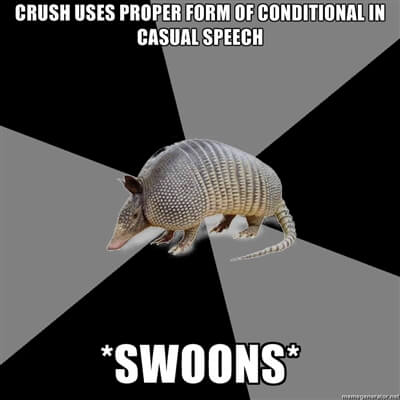No one requires a spotless resume more than an English major. Little attention to detail, incorrect grammar and ambiguous writing offend any employer, but just imagine a distinguished publisher glaring at a resume that mistakes “collage” for “college.” Bummer. Your resume can flaunt your major and the skills it allowed you to acquire by manipulating it correctly. Check out these tips for impressing even the toughest interviewer.
1. Proofread, proofread, proofread
(By Giphy)
Steven Kunert, advisor and professor at Oregon State, can’t stress proofreading enough. “Anybody from any field who has errors in his or her resume will not do well with prospective employers, but it’s more critical for English majors who are expected to know all the rules,” Kunert said. And it’s true: jobs specifically seeking English majors will look straight past a resume with silly grammar or formatting errors. Proofread. And then proofread again. Or else face the consequence of telling your parents you didn’t get the job because you mistook “their” for “they’re.”
2. Intern somewhere you can write

(By quickmeme)
Before running to that internship a friend of a friend told you about just to get something on your resume, check it out and see if it will pay off. Susan de la Vergne, author and creator of the blog For English Majors, recommends internships that allow you to apply your writing ability and analytical skills. Sometimes internships can be spun the right way to provide these skills for a resume. Otherwise, the sketchy gig your uncle got for you might not be worth your precious time. You’re better off hanging out at the beach and working on that next Great American Novel you’ve been meaning to write but haven’t yet started.
3. Call out your analytical skills
(By Giphy)
Remember that literature class you took last semester where you wrote a comparative paper every week? I know, it was hell. As difficult as it was, though, you can’t really put it on your resume. You can, however, boast the analytical skills you gained. That’s right; when you pointed out aspects of Romanticism in Keats’ poetry, you were analyzing. In studying literature through close reading, researching and analyzing qualitative topics, your analytical skills are ready for the world to see. Call them out on your resume. “Developing the ability to work with ambiguity and understand nuance [is something that] employers WANT,” said de la Vergne. Kunert similarly points out that this skill should be mentioned in not only your resume, but also in cover letters.
4. Blog the day away
(By Giphy)
Writing and running your own blog provides endless benefits, not to mention it’s nearly the only place you can write whatever you please. Makeup? Sure. Live music? Definitely. Writing practice is only the beginning. Learning about skills such as search engine optimization, website design and social media marketing through your blog will make you look like a multi-faceted English major, since those skills look impressive and apply to endless opportunities. Talent Zoo even recommends blogs to read to become learned in the blogging world. Now you just have to think of something to write about… Is a blog solely consisting of Nicholas Sparks reviews too much? Perhaps.
5. Show your stuff

(By Meme Center)
You spent all that time in poetry class coming up with descriptive verbs for thesis statements; now let them shine. Your resume is a great opportunity to show your interviewer exactly why you became an English major – because you’re an impressive writer. Kunert reminds you to use distinct verbs to describe your experiences so that you aren’t telling employers something they already know. This means “worked front counter” doesn’t cut it. Duh. They know you worked, what else did you do? Your poetry professor screamed at you for using “demonstrates” too often, and so will an interviewer. De la Vergne also recommends using complete sentences here and there to show your impressive level of literacy.
6. Focus on your skills, not your title

(By For Lack of a Better Comic)
As much as you’d love to apply to companies that recognize the depth of an English major and love you for the lit-geek you are, that’s not always the case. That being said, applying for jobs that don’t necessarily look for English majors requires a different resume setup. De la Vergne advises placing education last on a resume. No applicant wants to be dismissed before the employer even reaches the experience section just because of his major. Imagine the interviewer scoffing, thinking you spent four years reading novels. The horror! Put your experiences first. The key is to never publicize your major, but the skills you have acquired in your learning.
7. Destroy shyness and communicate

(By fyeahenglishmajorarmadillo)
Hopefully you’re not the type who has a great voice on paper but can’t utter a single word in the face of a stranger. If you are, get over it. Train yourself with the simplest of interactions, like ordering a coffee and interacting with the barista, and you’ll become a seasoned speaker in no time. Most employers look for strong communication skills and your writing and speaking experience are exactly what you need to demonstrate. Kunert and de la Vergne both stress being clear about what your communication skills entail. “Possesses communication skills” tells nothing; go in depth about how you communicate to impress employers of any sector.
(Main photo by Giphy)



















